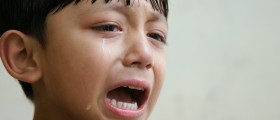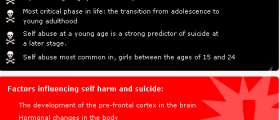
Importance of Mental Health Problems in Children and YoungAdults
Mental health problems, such as conduct disorder, anxiety,and depression, have a prevalence of about 1 in every 10 individuals, and arestrongly associated with events occurring in their lives. Mental health forchildren and young adults is just as crucial as the physical, for the formerplays a substantial part in learning to deal with challenges of life and growinginto a healthy person. There are many factors that aid in preserving a child’spsychological well-being that parents should provide including being part of aloving and supporting family that nurtures positive values, attending a schoolin which a child feels physically and mentally secure, eating healthy and beingactive, having enough time to engage in play, and having a circle of friends.
On the part ofthe child, it is essential that he/she is eager to learn and explore, feelssecure, loved, and appreciated, understands that he/she might not be as good insome activities but may be better in others, and that the child is resilient and capable tosolve problems. The majority of children grow up to be psychologically healthyadults, but research shows that mental health issues are on the rise among thisparticular population. That is, there are more individuals suffering frommental instability in this day and age than 30 years ago. In addition, a child’slife is filled with constant change, such as starting school or getting abrother or a sister. Some changes will have positive or neutral consequences whilethere will be events that could trigger problems a child is genetically orpsychologically predisposed to develop.
When it comes to teenagers, their lives arefilled with change as their bodies and minds start to transition from children’sto those of adult’s. It is critical that they learn proper ways to deal with noveltyso that they do not turn to the destructive kinds of coping strategies such asalcohol or drug abuse.
Risk Factors
There are always risk factors that can contribute to thedevelopment of mental problems and they differ for every individual, but some ofthe more general ones include being chronically sick, living with a parent or acaregiver who suffers from mental health problems, substance abuse, and so on,having to deal with the death of someone close at an early age, divorce ofparents, any kind of abuse, living in poor conditions, having to deal withbeing discriminated against for things like nationality, race, religion, and soon, having to take on more responsibility than is appropriate at a given age,and not doing well in school.
How Parents Can Help
As parents play the most important roles in the lives ofchildren, their help is preserving the child’s mental health is crucial. Ayoung troubled individual may only need a hug or a few words that will reassurehim or her that the problem will be resolved quickly and effectively. However,if the parents see that the symptoms of depression or anxiety are more persistent,they are strongly encouraged to seek professional help.
Types of Mental Health Problems
Depression is a very common mental health problem inteenagers, a little less so in young children, but it has nevertheless been onthe rise in the past few decades. Inflicting self-harm is another kind ofdisturbed behavior that in some young people relieves emotional pain. Such behavior usually includes burning or cutting oneself without wishing to takeone’s life. Various forms of anxiety are also present in both younger and olderchildren. Another obvious kind of psychological problem that can be present inthe lives of children and teenagers is the post-traumatic stress disorder that canbe triggered by witnessing or experiencing very disturbing incidents such asdeath, disasters, or any kind of severe abuse. Finally, various kinds of eatingdisorders as well as ADHD are also very prevalent among this population.
Professional Help
When it comes to diagnosing and treating a mental healthissue with children and young adults, professionals usually focus oncommunication and understanding of the problem for all parties involved. Forreally young children all aspects of therapy are done through play, although insome cases a therapist might prescribe medications for both younger and olderindividuals.
Mental Health Problem in Children Are on the Rise
Evidence suggests that psychological issues in children aremore prevalent now that they were 20 to 30 years ago. In Australia, forinstance, 1 out of 7 individuals younger than 13 years is at risk ofdeveloping mental health problems, and out of half a million affected onlyabout one quarter receives help. There are population groups in which childrenare at an even higher risk, and those include the Aboriginal People, childrenliving with a disability, or children living in institutions.

















Your thoughts on this
Loading...